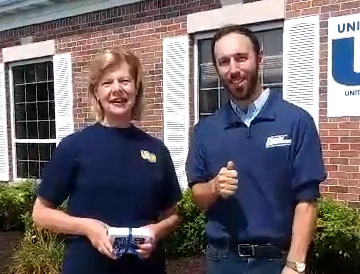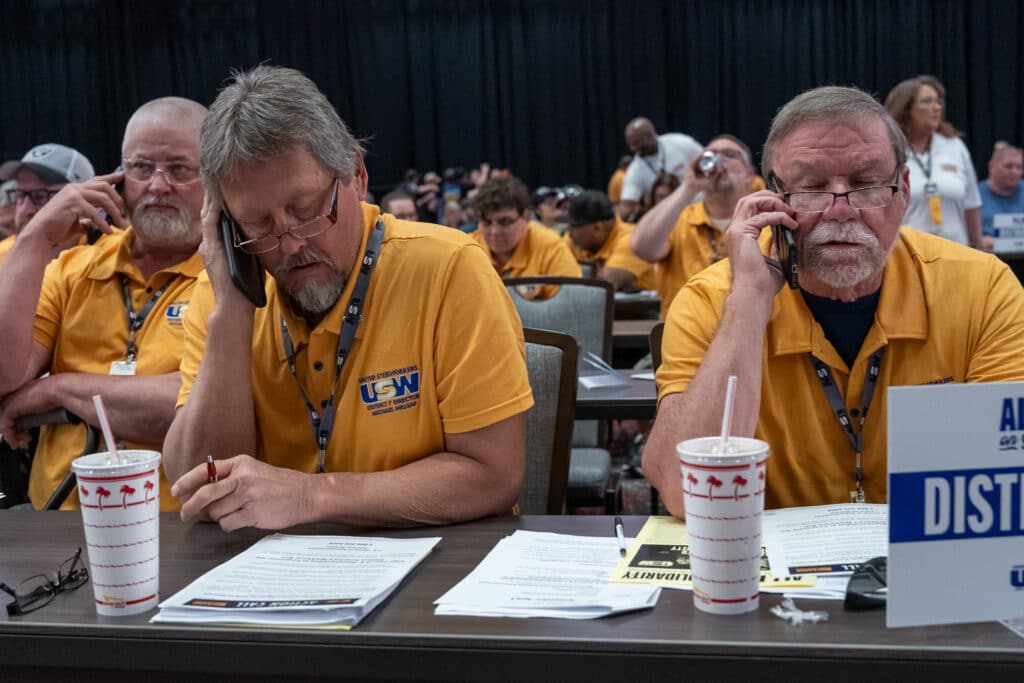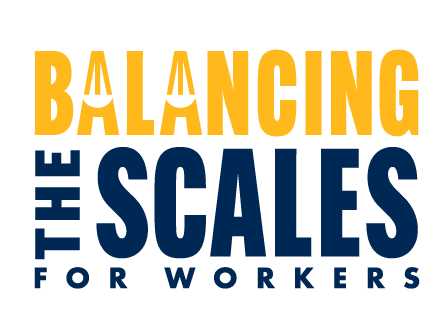Rapid Response Coordinator Spotlight: Caleb Phillip USW Local 2-727
 For months Steelworkers have been hard at work educating our members and our legislators about the role we play in our nation’s infrastructure through our We Supply America Campaign.
For months Steelworkers have been hard at work educating our members and our legislators about the role we play in our nation’s infrastructure through our We Supply America Campaign.
Rapid Response teams from all over the country have played an enormous part in ensuring that our message is heard.
Recently we were able to catch up with Caleb Phillip, a new Rapid Response coordinator in District 2 at Local 2-727 in Menasha, WI, who is doing this work.
We talked about why he got involved in Rapid Response, how his first year as a coordinator has gone, and his experience with our We Supply America Campaign. Here’s what he had to say:
What got you involved in Rapid Response?
I happened to pick up an old copy of Sherrod Brown’s “Myths of Free Trade: Why American Trade Policy Has Failed” from a used bookstore. Reading about the unrestrained, seemingly unstoppable power of giant corporations, and their endless quest for profit to the detriment of working people, I found myself inspired to find a way to make myself useful in the fight to preserve the rights of myself and my peers.
It so happened that my local had been looking to fill the position of Rapid Response Coordinator for some time, and I volunteered. I didn’t yet know just what I had volunteered for, but I knew I would be doing something help make the world better.
Why do you think Rapid Response is important?
The hardworking members of the United Steelworkers have in their unity a tremendous amount of power. The power to change the world, to reshape society, to build a better world for us all. Rapid Response is an amazing tool with which the USW can remind people of that power, to show them how to use it, and to inform them about issues that affect them directly.
There’s no question that a people united have power. The hard part is getting everyone on the same page, well informed, and moving in the right direction – that’s what Rapid Response is all about.
Even though your local was trained virtually, you were still able to get things moving. Did you focus on one-on-one conversations?
Absolutely. The first time I went out to spread the word about an ActionCall, I had to spend the minute-and-a-half of every conversation explaining who I was, what Rapid Response was, and what we were trying to accomplish generally, before addressing the actual Action Call. In doing so, I was able to build dozens of budding relationships with my local members. From there, every time a new InfoAlert, ActionCall, or Feedback Report came up, I was able to more easily communicate with my local the issue and why it was important to them, specifically.
Information received personally from someone who you know, and trust goes a lot further than any handout or flier, by itself.
What were the key things you learned during the training that you think are helpful?
Well, obviously the importance of one-on-one communication. It can’t be stressed enough.
The thing that I think about more than anything else from the training was a slide that laid out all the key points of focus that come up in contract negotiations – health care, wages, job security, hours of work, provisions for retirement, safety… And we were reminded that all of these things can be provided for through legislation. You don’t have to bargain for Social Security, or OSHA regulations, or pay at minimum wage, or time-and-half for hours worked over 40 hours. These are all enforced by laws, passed through the hard work of activists and organizers like us.
This to me was an incredibly important concept, and one I try to communicate to pretty much anyone who will listen.
What have you found to be the best method(s) to move people to action? Key techniques?
I’d like to think that what moves people to action is the message and the movement of protecting and growing worker’s rights and advancing their interests in a world where the blue-collar middle class seems to be on the verge of extinction.
But realistically, the thing that I feel moves people to call or email their representatives or senators, or sign a petition, or fill out a postcard is how easy you make it for them. Hand someone a phone number or a web address, tell them what to say and the importance of the action, and reassure them that it won’t take more than two minutes, and they run out of reasons not to do the action.
I don’t mean to sound cynical about it but the fact is, exercising your democratic rights should be easy. Communicating with politicians elected to represent you should be easy. Making your voice heard should be easy.
How have you worked to build the program during these challenging times?
A key component of our growing program has become the implementation of social media. Again, nothing is more important than in-person conversations, but this becomes difficult when “in-person” is no longer feasible. Rapid Response messages and Actions have also become much easier to share on social media, and therefor much easier to act on.
What obstacles have you overcome?
To put it bluntly – misinformation. Going back to my answer of the first question, there are employers out there with the resources to run costly, concerted campaigns to distort the truth and mold the will of the people to their purposes. They are tireless. They are very good at telling people what they want to hear, and in such a way that gets them to do or believe things that seem the opposite of what they should logically be doing or believing. If that makes sense.
Going against that can be… Frustrating. But, really, that’s the purpose of Rapid Response. We must get people the right information, to make sure that they know how issues will affect them. And, how they can affect the outcome of those issues. If that means politely questioning something that they heard from a highly partisan, not terribly reputable news source, so be it.
In late August, Caleb and the United Steelworkers of Local 2-727 hosted Senator Tammy Baldwin (WI-D) at the District 2 office in Menasha, WI to discuss infrastructure, domestic supply chains, and our We Supply America Campaign. A tireless proponent of workers’ rights, Sen. Baldwin is a strong supporter of more stringent Buy America standards, is an original cosponsor of the Make It in America Act (S 363) and voted in favor of the Infrastructure Investment and Jobs Act (HR 3684). Local 2-727 presented the Senator with a stack of postcards signed by 99 of its union members, attesting to their readiness and eagerness to rebuild our infrastructure, rejuvenate our communities, and restore those internal supply chains that are so essential to the functioning of our economy.
When asked about our We Supply America Campaign, Caleb responded, “It’s only when lawmakers respect and appreciate the strength and steadfastness of organized labor that they begin to understand the power this country has at its fingertips. We supply America, and we’re going to build it back better. Given the opportunity, we will make for ourselves the future we deserve.”
We couldn’t agree more!
If you would like to know more about how your local can get involved in Rapid Response, click HERE. And, to learn more about our We Supply America Campaign and sign our digital postcard go to www.uswvoices.org.
By clicking Sign Up you're confirming that you agree with our Terms and Conditions.
Recent News Articles
Want to Learn More?
See how the USW is making a real difference in our communities and our workplaces.

